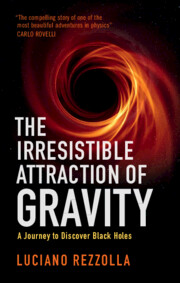Book contents
- The Irresistible Attraction of Gravity
- Reviews
- The Irresistible Attraction of Gravity
- Copyright page
- Dedication
- Epigraph
- Contents
- The Beginning of the Journey
- 1 Gravity … Attracts!
- 2 The Fathers of Gravity
- 3 Spacetime, Curvature and Gravity
- 4 How to Bend Spacetime
- 5 Neutron Stars: Wonders of Physics
- 6 Black Holes: Champions of Curvature
- 7 The First Image of a Black Hole
- 8 Gravitational Waves: Curvature in Motion
- The End of the Journey
- Acknowledgements
- Notes
- Index
5 - Neutron Stars: Wonders of Physics
Published online by Cambridge University Press: 02 March 2023
- The Irresistible Attraction of Gravity
- Reviews
- The Irresistible Attraction of Gravity
- Copyright page
- Dedication
- Epigraph
- Contents
- The Beginning of the Journey
- 1 Gravity … Attracts!
- 2 The Fathers of Gravity
- 3 Spacetime, Curvature and Gravity
- 4 How to Bend Spacetime
- 5 Neutron Stars: Wonders of Physics
- 6 Black Holes: Champions of Curvature
- 7 The First Image of a Black Hole
- 8 Gravitational Waves: Curvature in Motion
- The End of the Journey
- Acknowledgements
- Notes
- Index
Summary
Neutron stars are truly marvelous objects. They represent the end result of the evolution of very massive stars and are the “left-overs” of the enormous explosion that accompanies the death of these stars – namely, a supernova explosion. In a radius of a dozen of kilometers only, these stars can accumulate as much mass as twice that of the Sun, reach temperatures of tens of millions of degrees and magnetic fields that millions of billions larger than those on Earth. More importantly, by being so compact, these stars produce enormous gravitational fields, the largest gravitational fields for an object with a hard surface. This chapter will explain how neutron stars have been discovered and how we have learnt about their incredible properties. It will also stress that, although we now know quite a lot about neutron stars, they still represent a significant mystery in physics, since we have only a rather vague idea of what is inside neutron stars and how they can be built in nature.
Keywords
- Type
- Chapter
- Information
- The Irresistible Attraction of GravityA Journey to Discover Black Holes, pp. 65 - 104Publisher: Cambridge University PressPrint publication year: 2023

